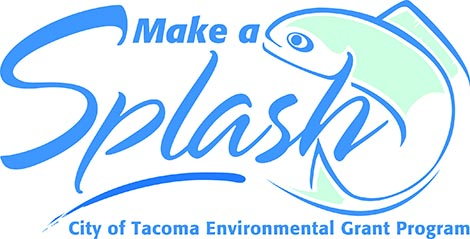This is the third in a series of articles sponsored by the City of Tacoma, its Environmental Services Department, and the Make a Splash grant program to inform people about ways to limit their impact on local waterways and the overall environment.
More than dirt comes off a car when it’s washed. There’s also grime that contains oil, solvents, anti-freeze and heavy metals such as zinc, lead and copper. That’s important to remember if you wash your car at home, where the dirty soap and water carrying all those chemicals can start a journey that ends in streams, rivers and Puget Sound.
As the City of Tacoma’s Office of Environmental Services points out, water that goes down storm drains flows directly into Tacoma waterways –and so do all the pollutants the draining water picks up along the way. A city program marks storm drains with a friendly reminder that stormwater winds up in the nearest creeks, streams or Commencement Bay. In an ongoing effort to prevent that pollution, the city’s Surface Water Management program maintains more than 500 miles of public stormwater pipe, 22,000-plus storm drains (catch basins,) four pump stations and numerous detention ponds.
Car owners can help by washing their vehicles the right way by taking them to a commercial car wash, which recycles, collects and treats wastewater.
Professional car washes use oil/water separators that remove pollutants, which are ultimately pumped out and properly disposed of. Wastewater is discharged into the sanitary sewer. In addition, professional washes use minimal amounts of water compared to do-it-yourselfers.
Here’s some more advice from Environmental Services for washing your car in ways that prevent negative impacts downstream:
- Use soap or detergent that is phosphate-free. Phosphates can strip water of oxygen that fish need to survive.
- Sweep driveways and street gutters before you wash your car in order to prevent dirt, leaves and trash from going down the drain.
- Groups that want to raise money from car washes should consider selling car wash tickets or from professional car washes instead. The Puget Sound Car Wash Association offers car wash coupons at charitycarwash.org, or call 206-622-8425.
The Puget Sound Car Wash Association is at the forefront of its industry’s effort to protect waterways from pollution caused by washing cars and trucks. It received the Community Service Leadership Award from the International Car Wash Association for educating the public on facts about car washes and water pollution, such as this: A 10-minute home car wash can use as much as 140 gallons of water. Commercial car wash equipment can clean a car in a few minutes, using between 15 and 60 gallons, depending on the equipment used and whether it is a self-serve or conveyor wash. Compare those numbers with some other common uses of water: Flushing a toilet, five to seven gallons; a 10-minute shower, 25 to 50 gallons; running a washing machine at top water level, 60 gallons; brushing teeth, two gallons.
DO PUGET SOUND A FAVOR: PUT THE BRAKES ON DRIPS
Watching for and fixing oil leaks is another way that car owners can help the environment.
An estimated 7 million quarts of motor oil that leaks from vehicles finds its way into the Puget Sound watershed each year. The state Department of Ecology says one-third of Washington’s water pollution comes from chemicals such as automotive oil and other vehicle fluids flowing into storm drains. You’ll know your car is part of the problem if an oil stain or drip spot appears on the ground where you park it. Here’s what may be leaking from your vehicle, based on what you see:
- Brake fluid. Clear to brown, slightly yellow and slick; often appears near a wheel.
- Engine oil. Light brown to black, very greasy and slick; shows up under the front half of the vehicle.
- Transmission fluid. Reddish and thin, or brown and thick; middle and front of vehicle.
- Power steering fluid. Amber, reddish or light-brown in color, and thin; it’s at the very front of the vehicle.
- Coolant (anti-freeze). Yellow, green or pink, greasy and slimy; watch for it at the front of the vehicle near the radiator or under the engine.
Besides protecting waterways, fixing leaks makes cars run better, too. For help in the process, go online at fixcarleaks.org for information about certified repair shops in the Puget Sound area that offer free leak inspections. You can also find out about free workshops that give advice on how you can maintain your car.
One more tip: City of Tacoma residents can recycle used motor oil at the city’s Household Hazardous Waste facility at the Tacoma Recovery and Transfer Center. Additional information is available at 253- 591-5418.